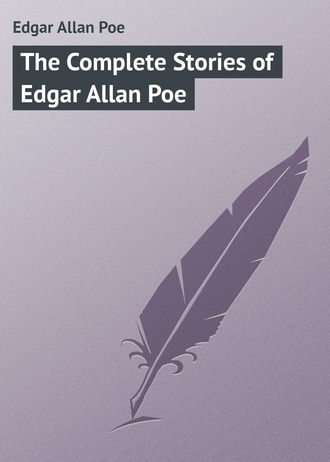
Эдгар Аллан По
The Complete Stories of Edgar Allan Poe
One fine day, having strolled out together, arm in arm, our route led us in the direction of a river. There was a bridge, and we resolved to cross it. It was roofed over, by way of protection from the weather, and the archway, having but few windows, was thus very uncomfortably dark. As we entered the passage, the contrast between the external glare, and the interior gloom, struck heavily upon my spirits. Not so upon those of the unhappy Dammit, who offered to bet the Devil his head that I was hipped. He seemed to be in an unusual good humor. He was excessively lively – so much so that I entertained I know not what of uneasy suspicion. It is not impossible that he was affected with the transcendentals. I am not well enough versed, however, in the diagnosis of this disease to speak with decision upon the point; and unhappily there were none of my friends of the “Dial” present. I suggest the idea, nevertheless, because of a certain species of austere Merry-Andrewism which seemed to beset my poor friend, and caused him to make quite a Tom-Fool of himself. Nothing would serve him but wriggling and skipping about under and over everything that came in his way; now shouting out, and now lisping out, all manner of odd little and big words, yet preserving the gravest face in the world all the time. I really could not make up my mind whether to kick or to pity him. At length, having passed nearly across the bridge, we approached the termination of the foot way, when our progress was impeded by a turnstile of some height. Through this I made my way quietly, pushing it around as usual. But this turn would not serve the turn of Mr. Dammit. He insisted upon leaping the stile, and said he could cut a pigeon-wing over it in the air. Now this, conscientiously speaking, I did not think he could do. The best pigeon-winger over all kinds of style, was my friend Mr. Carlyle, and as I knew he could not do it, I would not believe that it could be done by Toby Dammit. I therefore told him, in so many words, that he was a braggadocio, and could not do what he said. For this, I had reason to be sorry afterwards; – for he straightway offered to bet the Devil his head that he could.
I was about to reply, notwithstanding my previous resolutions, with some remonstrance against his impiety, when I heard, close at my elbow, a slight cough, which sounded very much like the ejaculation “ahem! ” I started, and looked about me in surprise. My glance at length fell into a nook of the framework of the bridge, and upon the figure of a little lame old gentleman of venerable aspect. Nothing could be more reverend than his whole appearance; for, he not only had on a full suit of black, but his shirt was perfectly clean and the collar turned very neatly down over a white cravat, while his hair was parted in front like a girl’s. His hands were clasped pensively together over his stomach, and his two eyes were carefully rolled up into the top of his head.
Upon observing him more closely, I perceived that he wore a black silk apron over his small-clothes; and this was a thing which I thought very odd. Before I had time to make any remark, however, upon so singular a circumstance, he interrupted me with a second “ahem!”
To this observation I was not immediately prepared to reply. The fact is, remarks of this laconic nature are nearly unanswerable. I have known a Quarterly Review nonplused by the word “Fudge! ” I am not ashamed to say, therefore, that I turned to Mr. Dammit for assistance.
“Dammit,” said I, “what are you about? don’t you hear? – the gentleman says ‘ahem! ‘ ” I looked sternly at my friend while I thus addressed him; for to say the truth, I felt particularly puzzled, and when a man is particularly puzzled he must knit his brows and look savage, or else he is pretty sure to look like a fool.
“Dammit,” observed I – although this sounded very much like an oath, than which nothing was farther from my thoughts – “Dammit,” I suggested – “the gentleman says ‘ahem! ‘ “
I do not attempt to defend my remark on the score of profundity; I did not think it profound myself; but I have noticed that the effect of our speeches is not always proportionate with their importance in our own eyes; and if I had shot Mr. D. through and through with a Paixhan bomb, or knocked him in the head with the “Poets and Poetry of America,” he could hardly have been more discomfited than when I addressed him with those simple words – “Dammit, what are you about? – don’t you hear? – the gentleman says ‘ahem!’ “
“You don’t say so?” gasped he at length, after turning more colors than a pirate runs up, one after the other, when chased by a man-of-war. “Are you quite sure he said that? Well, at all events I am in for it now, and may as well put a bold face upon the matter. Here goes, then – ahem! “
At this the little old gentleman seemed pleased – God only knows why. He left his station at the nook of the bridge, limped forward with a gracious air, took Dammit by the hand and shook it cordially, looking all the while straight up in his face with an air of the most unadulterated benignity which it is possible for the mind of man to imagine.
“I am quite sure you will win it, Dammit,” said he, with the frankest of all smiles, “but we are obliged to have a trial you know, for the sake of mere form.”
“Ahem!” replied my friend, taking off his coat with a deep sigh, tying a pocket-handkerchief around his waist, and producing an unaccountable alteration in his countenance by twisting up his eyes, and bringing down the corners of his mouth – “ahem!” And “ahem,” said he again, after a pause; and not another word more than “ahem!” did I ever know him to say after that. “Aha!” thought I, without expressing myself aloud – “this is quite a remarkable silence on the part of Toby Dammit, and is no doubt a consequence of his verbosity upon a previous occasion. One extreme induces another. I wonder if he has forgotten the many unanswerable questions which he propounded to me so fluently on the day when I gave him my last lecture? At all events, he is cured of the transcendentals.”
“Ahem!” here replied Toby, just as if he had been reading my thoughts, and looking like a very old sheep in a reverie.
The old gentleman now took him by the arm, and led him more into the shade of the bridge – a few paces back from the turnstile. “My good fellow,” said he, “I make it a point of conscience to allow you this much run. Wait here, till I take my place by the stile, so that I may see whether you go over it handsomely, and transcendentally, and don’t omit any flourishes of the pigeon-wing. A mere form, you know. I will say ‘one, two, three, and away.’ Mind you start at the word ‘away.’ ” Here he took his position by the stile, paused a moment as if in profound reflection, then looked up and, I thought, smiled very slightly, then tightened the strings of his apron, then took a long look at Dammit, and finally gave the word as agreed upon —
One – two – three – and – away!
Punctually at the word “away,” my poor friend set off in a strong gallop. The stile was not very high, like Mr. Lord’s – nor yet very low, like that of Mr. Lord’s reviewers, but upon the whole I made sure that he would clear it. And then what if he did not? – ah, that was the question – what if he did not? “What right,” said I, “had the old gentleman to make any other gentleman jump? The little old dot-and-carry-one! who is he? If he asks me to jump, I won’t do it, that’s flat, and I don’t care who the devil he is.” The bridge, as I say, was arched and covered in, in a very ridiculous manner, and there was a most uncomfortable echo about it at all times – an echo which I never before so particularly observed as when I uttered the four last words of my remark.
But what I said, or what I thought, or what I heard, occupied only an instant. In less than five seconds from his starting, my poor Toby had taken the leap. I saw him run nimbly, and spring grandly from the floor of the bridge, cutting the most awful flourishes with his legs as he went up. I saw him high in the air, pigeon-winging it to admiration just over the top of the stile; and of course I thought it an unusually singular thing that he did not continue to go over. But the whole leap was the affair of a moment, and, before I had a chance to make any profound reflections, down came Mr. Dammit on the flat of his back, on the same side of the stile from which he had started. At the same instant I saw the old gentleman limping off at the top of his speed, having caught and wrapped up in his apron something that fell heavily into it from the darkness of the arch just over the turnstile. At all this I was much astonished; but I had no leisure to think, for Mr. Dammit lay particularly still, and I concluded that his feelings had been hurt, and that he stood in need of my assistance. I hurried up to him and found that he had received what might be termed a serious injury. The truth is, he had been deprived of his head, which after a close search I could not find anywhere; – so I determined to take him home, and send for the homœopathists. In the meantime a thought struck me, and I threw open an adjacent window of the bridge; when the sad truth flashed upon me at once. About five feet just above the top of the turnstile, and crossing the arch of the foot-path so as to constitute a brace, there extended a flat iron bar, lying with its breadth horizontally, and forming one of a series that served to strengthen the structure throughout its extent. With the edge of this brace it appeared evident that the neck of my unfortunate friend had come precisely in contact.
He did not long survive his terrible loss. The homœopathists did not give him little enough physic, and what little they did give him he hesitated to take. So in the end he grew worse, and at length died, a lesson to all riotous livers. I bedewed his grave with my tears, worked a bar sinister on his family escutcheon, and, for the general expenses of his funeral, sent in my very moderate bill to the transcendentalists. The scoundrels refused to pay it, so I had Mr. Dammit dug up at once, and sold him for dog’s meat.
THE END
Three Sundays in a Week (1841)
“You hard-hearted, dunder-headed, obstinate, rusty, crusty, musty, fusty, old savage!” said I, in fancy, one afternoon, to my grand uncle Rumgudgeon – shaking my fist at him in imagination.
Only in imagination. The fact is, some trivial discrepancy did exist, just then, between what I said and what I had not the courage to say – between what I did and what I had half a mind to do.
The old porpoise, as I opened the drawing-room door, was sitting with his feet upon the mantel-piece, and a bumper of port in his paw, making strenuous efforts to accomplish the ditty.
Remplis ton verre vide!
Vide ton verre plein!
“My dear uncle,” said I, closing the door gently, and approaching him with the blandest of smiles, “you are always so very kind and considerate, and have evinced your benevolence in so many – so very many ways – that – that I feel I have only to suggest this little point to you once more to make sure of your full acquiescence.”
“Hem!” said he, “good boy! go on!”
“I am sure, my dearest uncle, [you confounded old rascal!] that you have no design really, seriously, to oppose my union with Kate. This is merely a joke of yours, I know – ha! ha! ha! – how very pleasant you are at times.”
“Ha! ha! ha!” said he, “curse you! yes!”
“To be sure – of course! I knew you were jesting. Now, uncle, all that Kate and myself wish at present, is that you would oblige us with your advice as – as regards the time – you know, uncle – in short, when will it be most convenient for yourself, that the wedding shall – shall – come off, you know?”
“Come off, you scoundrel! – what do you mean by that? – Better wait till it goes on.”
“Ha! ha! ha! – he! he! he! – hi! hi! hi! – ho! ho! ho! – hu! hu! hu! – oh, that’s good! – oh, that’s capital – such a wit! But all we want just now, you know, uncle, is that you would indicate the time precisely.”
“Ah! – precisely?”
“Yes, uncle – that is, if it would be quite agreeable to yourself.”
“Would’nt it answer, Bobby, if I were to leave it at random – some time within a year or so, for example? – must I say precisely?”
“If you please, uncle – precisely.”
“Well, then, Bobby, my boy – you’re a fine fellow, are’nt you? – since you will have the exact time, I’ll – why I’ll oblige you for once.”
“Dear uncle!”
“Hush, sir!” [drowning my voice] – I’ll oblige you for once. You shall have my consent – and the plum, we mus’nt forget the plum – let me see! when shall it be? To-day’s Sunday – is’nt it? Well, then, you shall be married precisely – precisely, now mind! – when three Sundays come together in a week! Do you hear me, sir! What are you gaping at? I say, you shall have Kate and her plum when three Sundays come together in a week – but not till then – you young scapegrace – not till then, if I die for it. You know me – I’m a man of my word – now be off!” Here he swallowed his bumper of port, while I rushed from the room in despair.
A very “fine old English gentleman,” was my grand-uncle Rumgudgeon, but unlike him of the song, he had his weak points. He was a little, pursy, pompous, passionate, semicircular somebody, with a red nose, a thick skull, a long purse, and a strong sense of his own consequence. With the best heart in the world, he contrived, through a predominant whim of contradiction, to earn for himself, among those who only knew him superficially, the character of a curmudgeon. Like many excellent people, he seemed possessed with a spirit of tantalization, which might easily, at a casual glance, have been mistaken for malevolence. To every request, a positive “No!” was his immediate answer; but in the end – in the long, long end – there were exceedingly few requests which he refused. Against all attacks upon his purse he made the most sturdy defence; but the amount extorted from him, at last was generally in direct ratio with the length of the siege and the stubbornness of the resistance. In charity no one gave more liberally or with a worse grace.
For the fine arts, and especially for the belles-lettres, he entertained a profound contempt. With this he had been inspired by Casimir Perier, whose pert little query “A quoi un poete est il bon?” he was in the habit of quoting, with a very droll pronunciation, as the ne plus ultra of logical wit. Thus my own inkling for the Muses had excited his entire displeasure. He assured me one day, when I asked him for a new copy of Horace, that the translation of “Poeta nascitur non fit” was “a nasty poet for nothing fit” – a remark which I took in high dudgeon. His repugnance to “the humanities” had, also, much increased of late, by an accidental bias in favor of what he supposed to be natural science. Somebody had accosted him in the street, mistaking him for no less a personage than Doctor Dubble L. Dee, the lecturer upon quack physics. This set him off at a tangent; and just at the epoch of this story – for story it is getting to be after all – my grand-uncle Rumgudgeon was accessible and pacific only upon points which happened to chime in with the caprioles of the hobby he was riding. For the rest, he laughed with his arms and legs, and his politics were stubborn and easily understood. He thought, with Horsley, that “the people have nothing to do with the laws but to obey them.”
I had lived with the old gentleman all my life. My parents, in dying, had bequeathed me to him as a rich legacy. I believe the old villain loved me as his own child – nearly if not quite as well as he loved Kate – but it was a dog’s existence that he led me, after all. From my first year until my fifth, he obliged me with very regular floggings. From five to fifteen, he threatened me, hourly, with the House of Correction. From fifteen to twenty, not a day passed in which he did not promise to cut me off with a shilling. I was a sad dog, it is true – but then it was a part of my nature – a point of my faith. In Kate, however, I had a firm friend, and I knew it. She was a good girl, and told me very sweetly that I might have her (plum and all) whenever I could badger my grand-uncle Rumgudgeon, into the necessary consent. Poor girl! – she was barely fifteen, and without this consent, her little amount in the funds was not come-at-able until five immeasurable summers had “dragged their slow length along.” What, then, to do? At fifteen, or even at twenty-one (for I had now passed my fifth olympiad) five years in prospect are very much the same as five hundred. In vain we besieged the old gentleman with importunities. Here was a piece de resistance (as Messieurs Ude and Carême would say) which suited his perverse fancy to a T. It would have stirred the indignation of Job himself, to see how much like an old mouser he behaved to us two poor wretched little mice. In his heart he wished for nothing more ardently than our union. He had made up his mind to this all along. In fact, he would have given ten thousand pounds from his own pocket (Kate’s plum was her own) if he could have invented anything like an excuse for complying with our very natural wishes. But then we had been so imprudent as to broach the subject ourselves. Not to oppose it under such circumstances, I sincerely believe was not in his power.
I have said already that he had his weak points; but, in speaking of these, I must not be understood as referring to his obstinacy: that was one of his strong points – “assurement ce n’etait pas sa foible.” When I mention his weakness I have allusion to a bizarre old-womanish superstition which beset him. He was great in dreams, portents, et id genus omne of rigmarole. He was excessively punctilious, too, upon small points of honor, and, after his own fashion, was a man of his word, beyond doubt. This was, in fact, one of his hobbies. The spirit of his vows he made no scruple of setting at naught, but the letter was a bond inviolable. Now it was this latter peculiarity in his disposition, of which Kate’s ingenuity enabled us one fine day, not long after our interview in the dining-room, to take a very unexpected advantage; and, having thus, in the fashion of all modern bards and orators, exhausted in prolegomena, all the time at my command, and nearly all the room at my disposal, I will sum up in a few words what constitutes the whole pith of the story.
It happened then – so the Fates ordered it – that among the naval acquaintances of my betrothed, were two gentlemen who had just set foot upon the shores of England, after a year’s absence, each, in foreign travel. In company with these gentlemen, my cousin and I, preconcertedly paid, uncle Rumgudgeon a visit on the afternoon of Sunday, October the tenth, – just three weeks after the memorable decision which had so cruelly defeated our hopes. For about half an hour the conversation ran upon ordinary topics; but at last, we contrived, quite naturally, to give it the following turn:
Capt. Pratt. “Well I have been absent just one year. Just one year to-day, as I live – let me see! yes! – this is October the tenth. You remember, Mr. Rumgudgeon, I called, this day year, to bid you good-bye. And by the way, it does seem something like a coincidence, does it not – that our friend, Captain Smitherton, here, has been absent exactly a year also – a year to-day?”
Smitherton. “Yes! just one year to a fraction. You will remember, Mr. Rumgudgeon, that I called with Capt. Pratt on this very day, last year, to pay my parting respects.”
Uncle. “Yes, yes, yes – I remember it very well – very queer indeed! Both of you gone just one year. A very strange coincidence, indeed! Just what Doctor Dubble L. Dee would denominate an extraordinary concurrence of events. Doctor Dub —”
Kate. (Interrupting.) “To be sure, papa, it is something strange; but then Captain Pratt and Captain Smitherton didn’t go altogether the same route, and that makes a difference you know.”
Uncle. “I don’t know any such thing, you huzzy! How should I? I think it only makes the matter more remarkable. Doctor Dubble L. Dee” —
Kate. “Why, papa, Captain Pratt went round Cape Horn, and Captain Smitherton doubled the Cape of Good Hope.”
Uncle. “Precisely! – the one went east and the other went west, you jade, and they both have gone quite round the world. By the by, Doctor Dubble L. Dee” —
Myself, (hurriedly.) “Captain Pratt, you must come and spend the evening with us to-morrow – you and Smitherton – you can tell us all about your voyage, and we’ll have a game of whist and” —
Pratt. “Whist, my dear fellow – you forget. To-morrow will be Sunday. Some other evening” —
Kate. “Oh, no, fie! – Robert’s not quite so bad as that. To-day’s Sunday.”
Uncle. “To be sure – to be sure!”
Pratt. “I beg both your pardons – but I can’t be so much mistaken. I know to-morrow’s Sunday, because” —
Smitherton, (much surprised.) “What are you all thinking about? Was’nt yesterday, Sunday, I should like to know?”
All. “Yesterday, indeed! you are out!”
Uncle. “To-day’s Sunday, I say – don’t I know?”
Pratt. “Oh no! – to-morrow’s Sunday.”
Smitherton. “You are all mad – every one of you. I am as positive that yesterday was Sunday, as I am that I sit upon this chair.”
Kate, (jumping up eagerly.) “I see it – I see it all. Papa, this is a judgment upon you, about – about you know what. Let me alone, and I’ll explain it all in a minute. It’s a very simple thing, indeed. Captain Smitherton says that yesterday was Sunday: so it was; he is right. Cousin Bobby, and uncle and I, say that to-day is Sunday: so it is; we are right. Captain Pratt maintains that to-morrow will be Sunday: so it will; he is right, too. The fact is, we are all right, and thus three Sundays have come together in a week.”
Smitherton, (after a pause.) “By the by, Pratt, Kate has us completely. What fools we two are! Mr. Rumgudgeon, the matter stands thus: the earth, you know, is twenty-four thousand miles in circumference. Now this globe of the earth turns upon its own axis – revolves – spins round – these twenty-four thousand miles of extent, going from west to east, in precisely twenty-four hours. Do you understand, Mr. Rumgudgeon?”
Uncle. “To be sure – to be sure – Doctor Dub” —
Smitherton, (drowning his voice.) “Well, sir; that is at the rate of one thousand miles per hour. Now, suppose that I sail from this position a thousand miles east. Of course, I anticipate the rising of the sun here at London, by just one hour. I see the sun rise one hour before you do. Proceeding, in the same direction, yet another thousand miles, I anticipate the rising by two hours – another thousand, and I anticipate it by three hours, and so on, until I go entirely round the globe, and back to this spot, when, having gone twenty-four thousand miles east, I anticipate the rising of the London sun by no less than twenty-four hours; that is to say, I am a day in advance of your time. Understand, eh?”
Uncle. “But Double L. Dee” —
Smitherton, (speaking very loud.) “Captain Pratt, on the contrary, when he had sailed a thousand miles west of this position, was an hour, and when he had sailed twenty-four thousand miles west, was twenty-four hours, or one day, behind the time at London. Thus, with me, yesterday was Sunday – thus, with you, to-day is Sunday – and thus, with Pratt, to-morrow will be Sunday. And what is more, Mr. Rumgudgeon, it is positively clear that we are all right; for there can be no philosophical reason assigned why the idea of one of us should have preference over that of the other.”
Uncle. “My eyes! – well, Kate – well, Bobby! – this is a judgment upon me, as you say. But I am a man of my word – mark that! you shall have her, boy (plum and all,) when you please. Done up, by Jove! Three Sundays all in a row! I’ll go, and take Dubble L. Dee’s opinion upon that.”
THE END






